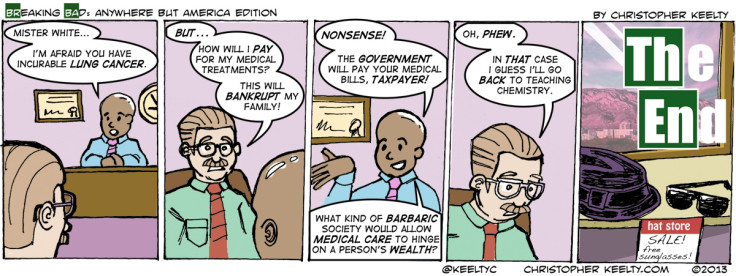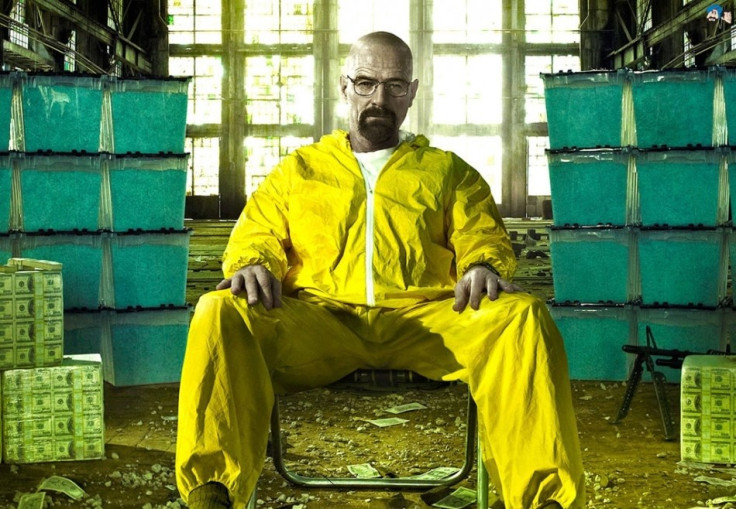The smugness of NHS cheerleaders is unwarranted - it is totally overrated

US TV series Breaking Bad is about a middle-aged high-school teacher, Walter White, who is diagnosed with lung cancer and unable to afford the treatment his doctor recommends. Out of desperation, he embarks on a criminal career in order to raise the money.
Since the streaming of the final series, a cartoon with the caption "If Breaking Bad had been set in the UK" has been making the rounds on social media. In the cartoon version, Walter's doctor simply informs him he is entitled to free medical care and the teacher decides to go carry on with his job at the school. Thus, the story ends, or rather, never begins.
The cartoon does not actually mention the UK (it just says "anywhere but America edition"). But when it comes to healthcare, there is a tacit consensus in the UK to pretend that there are only two health systems in the world to choose from, namely the NHS and the US system. Therefore the cartoon was quickly recast to be a strident defence of the NHS, with its universal coverage and free access to healthcare.
It is indeed quite conceivable that a British version of Breaking Bad would have been very short. But that is mainly because a British Walter White would probably have died soon after the diagnosis. The UK has the lowest lung cancer survival rate in the developed world.
A British lung cancer patients only has a one-in-10 chance of surviving the next five years. (This is a so-called relative survival rate, which, roughly speaking, means it strips out those who die with lung cancer, but not because of lung cancer.)
Patients in Latvia, Poland, the Czech Republic, Estonia, Slovenia and Slovakia face better odds, and the US survival rate is almost twice as high as the British rate. But forget the US. Survival rates in Italy, the Netherlands, Norway, Australia, Iceland, Sweden, Germany, Switzerland, Belgium, Canada, Austria and South Korea are also more than five percentage points higher than in Britain.
Given how common lung cancer is – about 45,000 new cases are diagnosed each year – a difference in survival rates of a few percentage points can translate into large numbers of lives that could have been saved through better and/or timelier treatment.
Had the UK's lung cancer patients sought treatment in France rather than on the NHS, there would have been almost 1,800 additional survivors. Had they been treated in the Netherlands, another 2,300 people could have survived; had they been treated in Australia, another 2,400 could have, and had they been treated in Switzerland or Germany, it would have been around 3,000.

So in short, yes of course there could be a British version of Breaking Bad. A British Walter White would try to raise money in order to seek treatment abroad.
But if the aim were to shoot a "boring" version of Breaking Bad, one could have set it in, for example, Austria, which has a universal healthcare system, and where the survival rate is about the same as in the US.
Unlike the American Walter White, an Austrian Herr Weiß would be protected against the risk of medical bankruptcy, and unlike a British Walter White, an Austrian Herr Weiß would also have a fighting chance of survival. What Austria does not have is state-run health service, nor is healthcare in Austria generally free at the point of use.
In hospital care, the private sector – charities and for-profit companies – accounts for a market share of about one third. Co-payments and other forms of patient charges account for about 15% of total health expenditure (there are exemptions for poor people).
We should judge healthcare systems by their outcomes, not vague intentions or fluffy 'founding ideals'
This is not a free-market system; it is a private-public hybrid system with mixed funding and mixed provision. But still, imagine the howls of outrage that would ensue if a British politician proposed to move even half of the way towards such a system.
However, lung cancer is not a special case and neither is Austria. It is generally true countries with competitive, pluralistic systems such as Australia, France, Japan, South Korea, the Netherlands, Germany and Switzerland do well across a wide range of health outcome measures. It is also true countries that have similarly uncompetitive systems, such as Ireland and Finland, often have problems similar to those of the NHS.
The smugness of NHS cheerleaders is therefore unwarranted. We should judge healthcare systems by their outcomes, not vague intentions or fluffy "founding ideals". Judged in this way, it turns out the NHS is a greatly overrated institution.
Dr Kristian Niemietz is Head of Health and Welfare at the Institute of Economic Affairs (IEA).
© Copyright IBTimes 2025. All rights reserved.






















